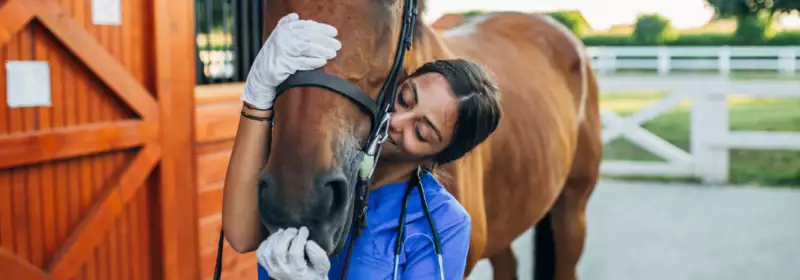Choosing to become a Veterinary Support Assistant is a great way to begin a career working with animals. There are fewer barriers to entry for this role compared to others, so you can get started quickly. Plus, it enables you to get a feel for what it’s like to work in a veterinary practice. However, there are still certain requirements you’ll have to meet and skills and character traits you’ll need to succeed.
Veterinary Support Assistants are important members of the modern veterinary team. You provide essential support to Veterinary Surgeons and Nurses as they treat animal patients. As well as perform a host of other duties that enable the veterinary practice to run effectively. Making sure all animal and human clients needs are met.
It’s a fast-paced and hands-on role that requires you to be knowledgeable and a quick thinker. While it doesn’t entail extensive training like other veterinary roles, you’ll still need to know a lot about animal care. And provide evidence of a Level 2 regulated qualification or above.
Not least because these roles are extremely competitive. You’ll need to have the knowledge and skills that give you the edge to make your application stand out.
If you want to become a Veterinary Support Assistant, find out more about the role and what you need below.

Is being a Veterinary Support Assistant right for me?
As a Veterinary Support Assistant, you're not likely to get bored in your role. Your range of responsibilities and the duties you’ll carry out make certain that no two days will be the same.
You might be helping surgeons in the operating room, supporting animals post-treatment or advising the public on pet care. Aside from adapting to different situations, you need to be prepared for physical work and lots of running around.
Your duties can include:
- Giving animals their medication and administering vaccinations
- Helping with x-rays
- Getting animals ready for surgery
- Taking calls and booking appointments
- Sterilising medical equipment and surgical instruments
- Record keeping
- Educating owners about animal care
- Applying bandages to fractures and wounds
- Providing animals with food, water and fresh bedding
- Assisting with euthanasia
- Monitoring pets before, during and post-surgery
- Restraining animals while they are examined and treated
- Assisting Veterinarians during surgery
- Responding to emergencies
- Cleaning and sanitising animal kennels and rooms in the practice
- Exercising and grooming inpatients
- Preparing the surgery area with the required equipment
Depending on where you work, your role may involve weekend and evening shifts. If you work in veterinary clinics, laboratories, research or teaching institutions, chances are you’ll work between 9am-5pm. But if you were to work in an emergency facility, you’re more likely to work in shifts as they operate through the night.
The hours can be long and your work will no doubt be physically and emotionally demanding. However, the sense of fulfilment you’ll feel from helping animals get and stay healthy makes your job extremely worthwhile.

The Skills you’ll Need
You need to have a certain set of skills and character traits to become a Veterinary Support Assistant. And they go much further than having a love for animals.
Employers will want to see that you’re a hard worker who they can depend on. They’ll also want to see that you can work well independently and with the rest of the team. But in addition to that, they’ll want to see that you’re capable of handling the emotional aspect of the work.
The essential qualities employers look for are:
Confidence
In most instances, vet teams are small and cover an expansive workload. You’ll often be supervised, but Veterinarians will be looking for confident individuals they know can handle duties alone if needed. They’ll also need to have confidence in your ability to work with pets and their owners.
Dedication
You can work long hours in this role, especially in cases of emergencies. Employers will want to see that you’re flexible and committed to animal care, even if that means staying late.
Empathy
The animal patients you’ll see are often brought in because they’re injured, in pain, or sick. This can leave both the animal and the owner in a state of distress. You’ll need to have empathy for both the animal requiring treatment and their emotional caregiver or owner. Having sympathy, being calm and supportive in these situations can help put the animal at ease and reassure their concerned owners.
Patience
In this fast-paced sometimes chaotic environment, emotions can run high. You’ll need to be patient with the public and your teammates at all times. No matter how busy you are or how other people and animals are acting.
Resilience
Helping animals get back to good health is undeniably an uplifting experience. But with this comes the times when the outcome won’t be so positive. Unfortunately, animal patients may pass away or have to be euthanised. You need to be able to separate your feelings from the situation and continue to perform your duties. Being resilient isn’t only important for you, pet owners need you to be composed and supportive in these difficult times.

What you need for the role
You need to obtain certain knowledge and skills to become an effective support worker at a veterinary practice or surgery.
Our Veterinary Support Assistant knowledge based-course focuses on teaching you the responsibilities of a supportive role at a veterinary practice. This course is a great starting point for anyone wishing to learn more about veterinary support roles. As it teaches you how this type of role can provide support to a qualified veterinary team.
The topics included in the course are:
- Veterinary Medical Terminology
- Basic Small Animal Anatomy and Physiology
- Handling Animals
- Animal Diet and Nutrition
- Animal Disease
- Small Animal Emergency Nursing
- Infection Control
- Diagnostic Tests used by Vets
- Care of Ill Animals
- Operation Care
- Euthanasia
- Safety and Welfare
You’ll cover a range of topics that prepare you for the diverse range of responsibilities that come with veterinary work. There is also an element of the course that helps you prepare for employment. So you have the best chance of success once you’ve completed this course and obtained a Level 2 regulated qualification. Such as a Veterinary Nurse Assistant Level 2 Diploma (RQF).
Get started online
What’s more, this course is available to study online from wherever suits you best. So if you need to requalify for your new career outside of your current job or family commitments, you can.
This also enables you to work through the course materials as quickly as you like.
If you’re considering a career as a Veterinary Support Assistant, consider getting your education through learndirect. As the leading UK distance learning provider, you can be assured that you’ll receive a quality education.
Our courses are made in collaboration with subject experts. So you’ll be taught topics that are highly relevant to the role and the duties you need to perform.
You will also receive tutor assistance when required and can take advantage of flexible payment methods.
Find out more now about how you can take the next to your career below. Simply click here view our Veterinary Support Assistant course in more detail. Alternatively, if you’re ready to start a rewarding animal career but don’t know which path to take, click the link to download our FREE animal course brochure below and find the course that suits your goal.



















